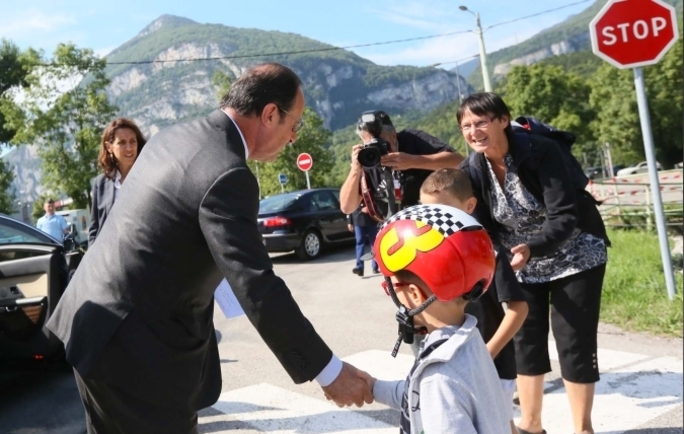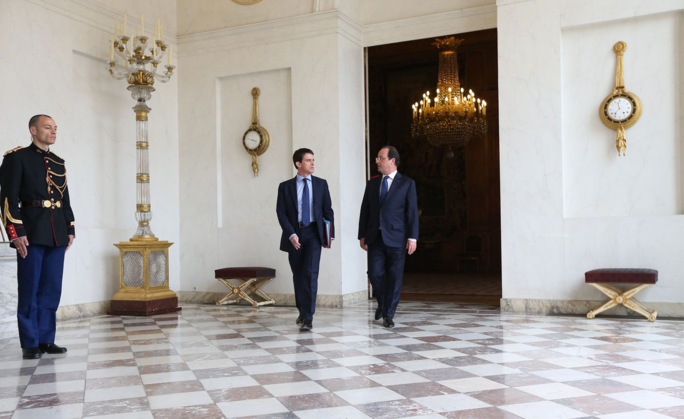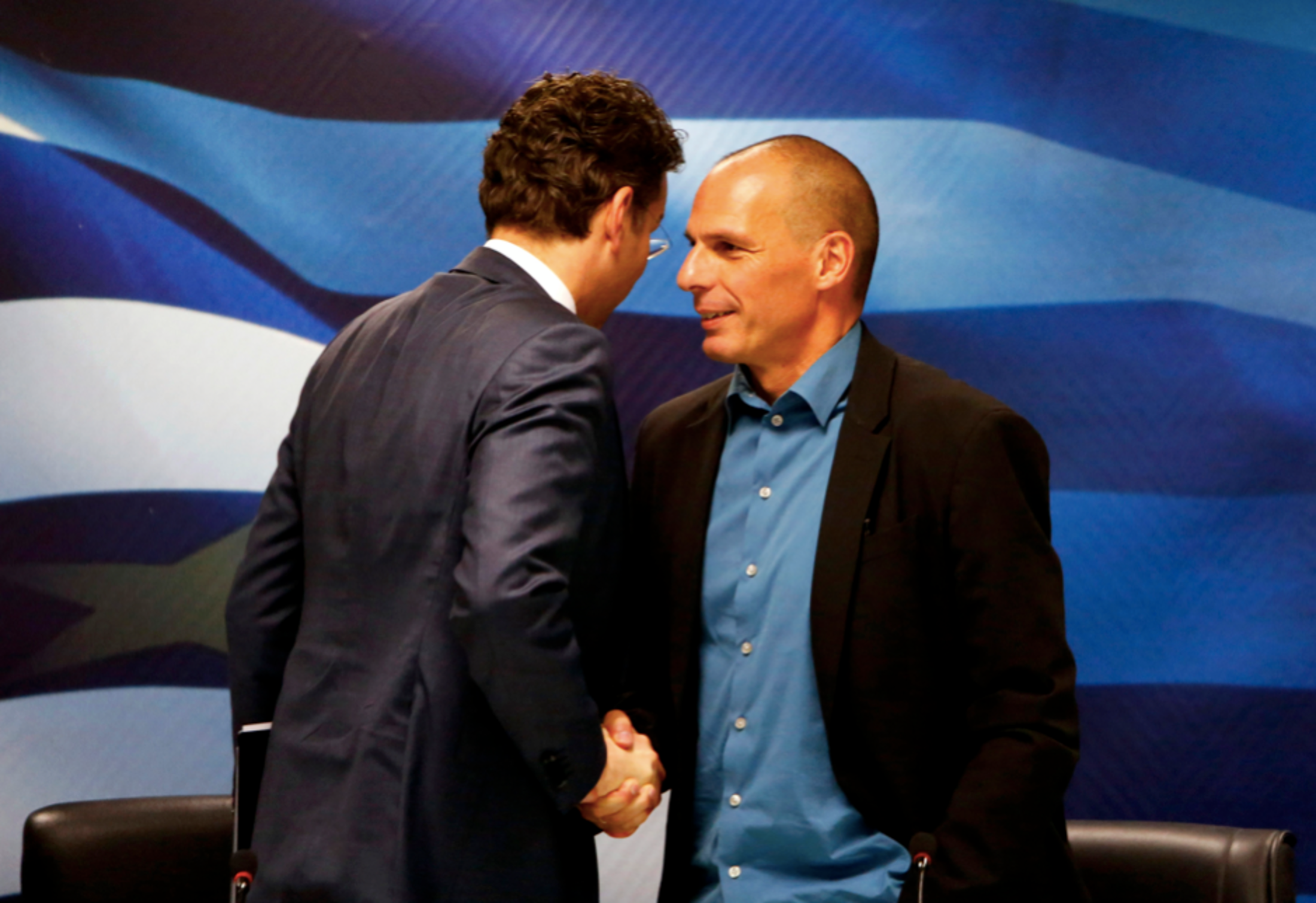When François Hollande, from the lofty heights of his forteress that is the Elysée Palace, gazes out onto the horizon he must feel a good reason to smile. What a grand summer this has been, and what a promising return back to to business now.
Just imagine how the situation was one year ago. The French president was engulfed in a serious crisis of government. Shadowed by a prime minister, Manuel Valls, who he appointed under constraint, that August 2014 was marked by his sackings of economy minister Arnaud Montebourg and education minister Benoît Hamon, and the resignation of culture minister Aurélie Filippetti. Earlier that year, Green EELV party housing minister Cécile Duflot and her EELV colleague and junior minister for development, Pascal Canfin, had also jumped from the train with only bad things to say about the driver.
It was worse still than the transformation of the government into one of a single party, ruling with only a slight socialist parliamentary majority, because that same majority was breaking up under the blows from its rebels within. For a number of political observers, the question raised was whether Hollande would even be able to complete his five-year term of office.

Enlargement : Illustration 1

So, what a lovely summer this year has been. The in-fighting of the far-right Le Pen family has resulted in them politically murdering themselves in public. Former president and opposition leader Nicolas Sarkozy, who eyes a return to power, had a serious new bling-bling accident when he appeared on the front cover of Paris-Match in a photo session during his holidays in Corsica (see right). Meanwhile, Sarkozy’s main rival for the conservative presidential primaries, Alain Juppé, celebrated his 70th birthday by publishing a book on education. While the Greens headed further towards deep splits, and radical-left leader Jean-Luc Mélenchon continued with his quest for a Bolivar-like winning formula by putting all his critics to the sword.
As for the Socialist Party, it has returned to marching order since the wet blanket of its national congress in Poitiers in June. Lifeless, empty of ideas, and emptied of a section of its militant forces – it is what is expected of a party which is required to support government. As for the leftist rebels, a few billion euros opportunely redirected in the 2016 public budget will neutralize them, while a few ministerial folding seats remain available to them and also the Greens.
So it is that from within his bubble of power, François Hollande can savour the pleasure of a good job done. Some people, including those close to him, had believed him to be cornered, stripped by Manuel Valls, sentenced to be tarred and feathered in the presidential elections due in 2017. But 12 months on, those same ones now salute his political recovery, thundering “Who else but him?” An illustration of this is that nobody in the Socialist Party today dares to argue the case for primaries in which to choose its next presidential candidate, such it is that the choice of Hollande has been made and cannot be undone.
A product of the 1980s political school of late socialist president François Mitterrand, Hollande has regained the upper hand, through his management of time, of people and with his tactical skills. Manuel Valls is among those who disappeared during the summer, a period the prime minister has previously enthusiastically filled with high-profile trips and rousing speeches.
Beyond the smoking rubble of the field of ruins where lie his opponents and rivals, the horizon towards 2017 is clearing for Hollande. His drubbing is no longer certain, and victory – that is, his re-election – has become plausible, and is even certain according to the idolatrous.

Enlargement : Illustration 2

- The far-right on a suicide mission
Unexpected, the fighting within the Le Pen family-run business that is the far-right Front National party has been a godsend (see here and here). A boon for the mainstream Right, naturally, which can now hope that the significant surge of support for the Front National will be halted, and it can even hope that it might win back a large number of its traditional electorate that crossed over to the far-right. But there is also relief for the socialists in the fact that the father-daughter feud now casts doubt on the scenario by which Front National leader Marine Le Pen would attract enough votes in 2017 presidential elections to see her through to the final second-round playoff.
There is hardly any doubt that Marine Le Pen’s 87-year-old father, Front National founder Jean-Marie Le Pen, will only cease to exact terrible vengeance upon his ‘patricidal’ daughter when he dies. A fatal accident aside, months of internal battles and diverse public displays of dirty washing now await the Front National. In 1998, Le Pen the father reduced to dust his internal rival Bruno Mégret after his attempted putsch. Even tired, the former paratrooper has conserved an impressive capacity for wreaking harm, which he will make sure of employing to knock his daughter to the ground.
Whether or not a reconciliation might eventually come about, to the cost of collateral damage among the entourage of Marine Le Pen, there will nevertheless remain numerous threats for the far-right party and its leaders in the form of a series of judicial investigations currently underway into the obscure financial structures and funding that irrigate the Front National. The results of these might well end up blocking the road for the candidature of Marine Le Pen in the 2017 presidential elections.
Hollande is in a warm-up stage for a 2017 re-election bid
- The mainstream Right in A&E
The situation for the mainstream Right is not certain to be any better. It has still not begun its convalescence from the divisions sparked after its defeat in the presidential and parliamentary elections of 2012. A reconstruction might come about in 2016, during the long months that will lead up to the primaries to designate its candidate in the 2017 presidential elections. But from now until then, the former UMP party, now renamed Les Républicains, is forced to watch the little horse race between Nicolas Sarkozy, Alain Juppé and Bruno Le Maire as frontrunners for the party’s presidential candidate, with former prime minister François Fillon, and former ministers Xavier Bertrand and Christian Estrosi galloping behind.
The surprise in all this is Nicolas Sarkozy. Elected by a large majority as leader of the conservative party last November, he has since then only managed to notch up a series of contradictory gesticulations. The surprise here is that previously, in adverse conditions, he succeeded in building a formidable and successful war machine in the years leading up to his election as president in 2007. But now he is unable to federate and rebuild an effective entourage, nor to engage his party to work on policy programmes and a vision of government. By viewing the 2017 elections as a question of personal and intimate revenge on past defeat, Sarkozy has fuelled defections, opposition and rival candidatures.
Which is why François Hollande and his Elysée advisors hold a preference which is barely-hidden that Sarkozy succeeds in becoming the candidate of the mainstream Right in 2017. Not least because here, too, just as with the Front National, the multitude of diverse financial scandals threaten to produce a few fatal implosions. The numerous ongoing judicial investigations directly targeting the conservatives (into the Libyan financing of Sarkozy’s 2007 election campaign, into the Bygmalion fake invoicing system , and into the misuse of public funds by its senators to mention but some) promise to have spectacular developments.
- An alternative Left that has become stalled
The recent European and local elections demonstrated the fact. The massive public rejection of the government and the burying of the socialists’ 2012 election campaign pledges did not profit other sections of the Left, and a disorientated electorate chose abstention. In the end, François Hollande surmounted the key moments when a political re-composition might have occurred, such as when leading Green party figure Cécile Duflot resigned as housing minister in March 2014, or when Arnaud Montebourg and Benoît Hamon were driven out of government in August of the same year. On each occasion there were talks held between Socialist Party rebels, the radical-left Front de Gauche coalition and the departed ministers. But on each occasion they came to nothing, when the sickness that is presidential ambition too often had hold on the minds of the ones and the others.
The result is that a large decomposition is currently in process. It is present within the Green EELV party, where the various divisions and ambitions should logically conclude in a breakaway split of the party. As is also the case within the radical-left Front de Gauche coalition, where the divisions between the Communist Party and the Parti de Gauche (Party of the Left) has reduced it into a fuzzy, even opportunistic cartel. The political reconfigurations at a local level, like in the case of the municipal elections in Grenoble, and those to come in this year’s regional elections, do offer some possibilities. But they have little chance of becoming transformed into alliances at a national level where multiple disputes are joined by competing egos.

Enlargement : Illustration 3

- Hollande ‘warming-up’ his candidature for re-election
François Hollande knows all of the above better than anyone. Skilful in fanning the discords among the Greens, in recovering the rebels within his own party, he can hope to continue to command a very large swathe of the Left while emancipating himself from any policy constraints that emanate from that camp.
Is Hollande on the Left? The question is no longer pertinent such it is that the president deliberately refuses any reference to the Left. That was again the case in the interview he gave to several French regional newspapers last Thursday August 20th (the choice of regional papers mirrors the strategy of former president Jacques Chirac), when he made no reference to the Left but announced measures that the Right would be proud of, such as his pledge to lower taxes in 2016. That purely presidential announcement caught the government by surprise, with Manuel Valls the next day announcing that the tax reductions would be clarified next month and included in the 2016 budget bill.
Reducing taxes is the gimmick used by every politician who is about to embark on an election campaign. Hollande has now entered into a warm-up stage of a bid for re-election in 2017, about which there can be no doubt.
Two major issues that threaten Hollande
Thus, within the bubble of the Elysée Palace, there is again belief in a victory in 2017, but this is failing to recognise two major factors that threaten to upset the apple cart.
The first is a social crisis in France that continues to deepen, while the government offers no real perspective. The second concerns the multiple developments of the unprecedented European crisis triggered by the events in Greece.
By inviting former Greek finance minister Yanis Varoufakis as a guest speaker to his yearly ‘Fête de la rose’ gathering in his former constituency in central France at the weekend, Arnaud Montebourg was trying to pre-empt a subject that will continue to fill the European agenda over the coming months.

Enlargement : Illustration 4

- The boomerang that is Europe
“All these questions, austerity, debt, must be thought out at a European level,” commented Yanis Varoufakis in an interview published last Thursday in French weekly magazine l’Obs. “If there is no European movement to democratise the eurozone, no European people will see better days, neither the French, neither the Italians, nor the Irish. Nobody. It remains a fundamental combat for us to fight.”
The advent of a large French and European mobilization against austerity policies constitutes a major threat for François Hollande, he who is held to account for having abandoned, immediately after his election, any will to re-orientate Europe and to engage in a show of force in his relations with the German conservatives.
That is also whatYanis Varoufakis underlines, like so many others before him. “The French government had a view very close to ours. But apart from a few words of support made by [French economy minister] Michel Sapin, it didn’t turn into real support,” Varoufakis said. “His interventions were immediately rejected by the others, and more particularly [German finance minister Wolfgang] Schäuble. The Greek crisis and its inevitable prolongations and the Spanish elections – which may see the Podemos movement become a key player in November – will unceasingly feed the debate in France and highlight Hollande’s renunciations. Following on Jean-Luc Mélenchon, Arnaud Montebourg intends to fuel the debate in order to eventually launch himself as an alternative presidential candidate in 2017. Europe threatens to become a tripping stone for François Hollande.
Another European crisis which threatens the French government is that of the mass arrival of migrants. The incapacity of the European Union to develop coordinated, and simply decent, policies in face of the arrival of hundreds of thousands of refugees since the beginning of the year will rebound on the government. Until now its response has been one of policing (as once again demonstrated by the visit to Calais last week by interior minister Bernard Cazeneuve), leaving aside any attempt to explain to public opinion the new challenges of offering asylum and solidarity.
Far away from the political games, the essential issues remain: a social crisis that is deepening against a backdrop of mass unemployment and political choices that resolve nothing regarding France’s budgetary situation. Numerous Socialist Partybigwigs could point out that a presidential election does not hinge on an unemployment rate, but while that is true it is an underestimation of the impact of unemployment which, each month, reaches new historic records and which has, these last few years, has placed French society into a profoundly precarious state. From May 2012, when Hollande was elected, up until June 2015, the number of category A jobless has increased by 664,700. The numbers of unemployed of all categories has increased by 1, 147,800 during his term of office.
Following on a zero growth rate in the second quarter of this year, the government maintains its forecast of a growth rate of 1% in 2015, and of 1.5% in 2016. These are extremely weak rates, and weaker than those of a large number of European countries, and will not modify the social situation in France. That is the other timebomb ticking under Hollande’s candidature for re-election in 2017.
-------------------------
- The original French version of this article can be found here.
English version by Graham Tearse


